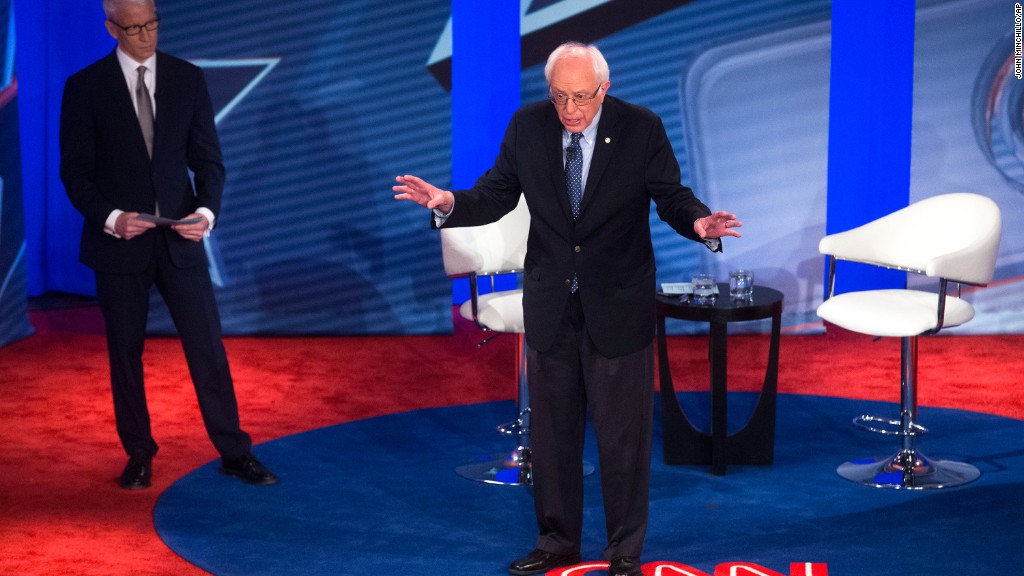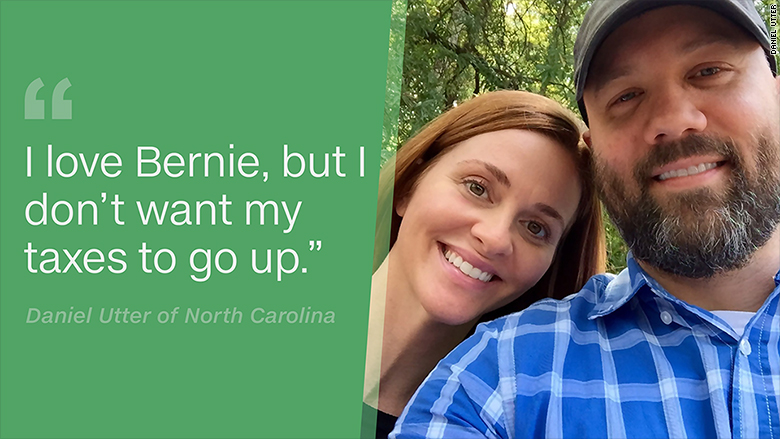
At age 40, Daniel Utter is about to become a father for the first time.
His family's future -- and America's -- are a lot more in focus now. He really likes the vision for America that Bernie Sanders has spelled out, but he's worried about the price tag.
"I love Bernie, but I don't want my taxes to go up," Utter told CNNMoney from his home outside Charlotte, North Carolina.
Utter is exactly the type of voter that Sanders is struggling to win over. Voters over 40 just aren't "feeling the Bern."
Sanders blows out Hillary Clinton among the college crowd. Despite being the oldest candidate in the running at age 74, Sanders also wins a lot of young professionals. He's had mixed results with 30 to 39-year-olds, but he almost never wins the 40+ voters.
People who are further along in their careers and earning more aren't so sure about Bernie.
Related: Sanders campaign: Clinton not 'sincere' on minimum wage
Middle class voters are worried about the economy
Utter considers himself solidly middle class. He has a job he enjoys as a motion designer (akin to video editing and animation) and earns a bit above the median U.S. income of $54,000. But he hasn't had a raise in years.
"I'm still trying to pay off my student loans and trying to buy a house, all these things," says Utter. "The second I get ahead a little bit, something pops up and I have to cough up $1,000."
With the baby on the way, he tries to pick up extra freelance jobs where he can. But like many Americans, he feels on edge. He was laid off during the Great Recession for a few months. He knows how quickly a middle class life can unravel.
"The old belief that going to college to learn a trade doesn't guarantee anything anymore," Utter, who has $10,000 more to pay off in student loans, believes. He advises younger relatives to to think carefully about how much they are likely to earn in their field.

Related: Americans fear a life of 'dead-end crap jobs with crap wages'
Sanders campaigns on a platform of providing free college (at public universities) and Medicare-for-all. But free health care and free college comes at a cost. The Tax Policy Center estimates that Sanders would have to enact the largest tax increase in peacetime history to pay for his programs.
"He's not talking about taxes going up a little bit," says Larry Sabato, director of the Center for Politics at the University of Virginia. "In order to pay for all the programs he's proposed, taxes would have to go up a lot."
Sanders stresses he wants the rich -- and Wall Street -- to fund his programs, but the middle class would get a higher bill too.
Related: Trump's latest wild claim: He'll fix the debt in 8 years
Bernie would raise middle class taxes a lot
A calculator from Vox and the Tax Policy Center gives voters a sense of how much their own taxes would go up under each candidate. Here's how much more a married couple with one child would pay if Sanders became president, according to the calculator:
- A couple earning $100,000 a year would pay $14,130 more.
- A couple earning $50,000 would pay $6,820 more.
- A couple earning $30,000 would pay $3,380 more
There is a lot of debate over whether the calculator is correct, much like there are arguments over how much Sanders' policies would grow the economy.
Sanders tells middle class voters that it's a trade-off: you pay more in taxes, but you get a lot more in government services.
"We raise your taxes if you're somewhere in the middle of the economy about $500, but you know what we're going to do for health care? We're gonna to reduce your health care costs by $5,000," he said at a CNN Town Hall in February.
Related: Under Sanders, income and jobs would soar, economist says
Bernie is a longshot
Enough voters don't seem convinced about the trade-off -- or that it would get through Congress. It's why political experts doubt that Sanders has a chance to win the election.
"He's not going to be president," says Sabato. "I just don't see any reasonable way for him to catch up."
Still, Sanders and his supporters have clout. They continue to force Clinton to move further left on issues like the minimum wage and ways to rein in Wall Street excess. Whether that's enough to influence a vote, depends on folks like Utter.


